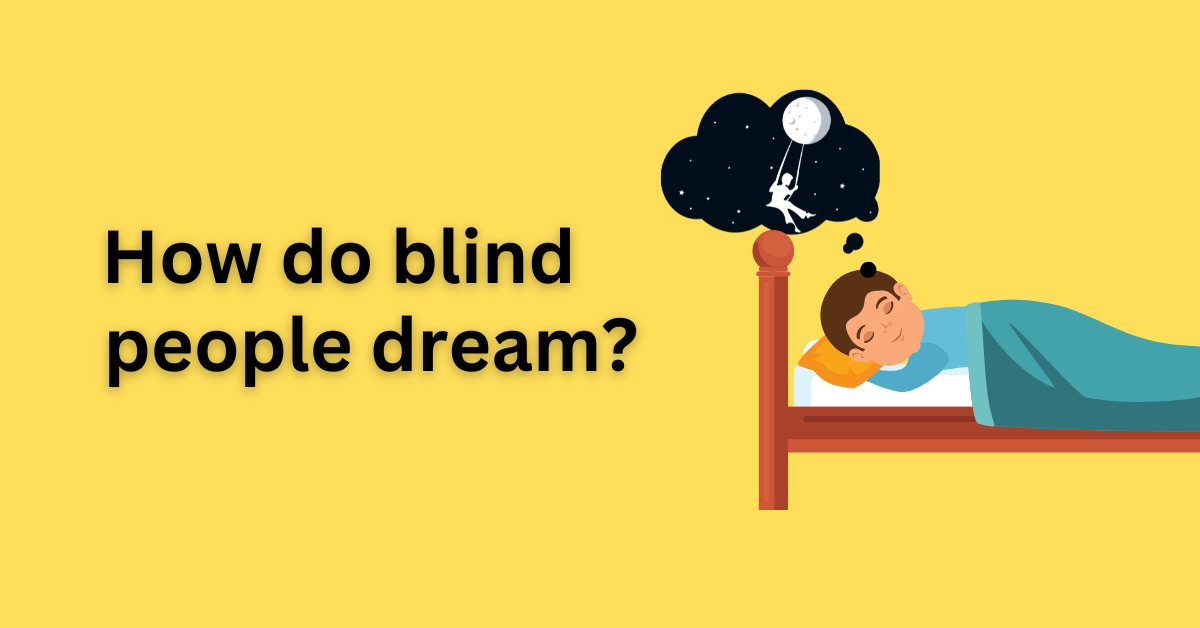As a blind individual, I often encounter questions about my experiences that differ from those of sighted individuals. One common question that people ask is Do blind people dream? It’s understandable to be curious about what it’s like to dream with blindness. In this blog post, I’ll be sharing my insights and experiences as a blind person, providing answers to some of the questions that I’ve encountered surrounding the topic of dreams and blindness. So if you’re a sighted person who’s curious about the dreams of blind people, or a fellow visually impaired individual who is interested in exploring the topic, let’s dive in!
Can Blind People Dream?
The short answer is yes, blind people can dream. In fact, studies have shown that people who have been blind since birth still experience dreams, despite never having had any visual perception. This is because the ability to dream is not dependent on the ability to see, but rather on the brain’s ability to create images and scenarios in our mind while we sleep.
Can dreams experience vary for blind people
Yes, dreams can be different for different blind people. Blind individuals have varying levels of visual impairment and can experience different types of blindness, such as congenital blindness, acquired blindness, or partial blindness.
For individuals who were born blind or who have been blind from a very young age, their dreams may consist of non-visual sensory experiences, such as sounds, smells, and tactile sensations. In contrast, people who have become blind later in life may continue to have visual imagery in their dreams, which can gradually fade over time as they become more accustomed to their blindness.
What Do Blind People Dream About?
Blind people can dream just like anyone else, but their dreams are typically based on their other senses, such as sound, touch, taste, and smell. Here are some examples of what blind people might dream about:
1. Soundscapes: Blind people might dream about sounds they have heard in real life or imagined sounds, such as music, conversations, animal noises, or the sound of the wind.
2. Tactile experiences: Blind people might dream about touching different textures, such as the softness of a pet’s fur or the roughness of a tree bark.
3. Smells: Blind people might dream about smells they have experienced before, such as the smell of flowers, food, or a particular perfume.
4. Memories: Blind people might dream about memories from their past, including events and people they have encountered.
5. Abstract concepts: Blind people might dream about abstract concepts such as emotions, thoughts, or ideas, which do not require any visual imagery.
Do Blind People Have Visual Dreams?
It is not uncommon for blind people to experience visual content in their dreams, even if they have never seen anything in their waking life. This is because the brain has the ability to create visual images based on other sensory input, such as sound and touch. So, while blind individuals may not have visual reference points in their everyday life, they may still experience visual content in their dreams.
Can Born Blind People Dream?
Yes, individuals who have been blind since birth can and do experience dreams. In fact, some studies have suggested that those who have been blind since birth may have more vivid and sensory-rich dreams, as their brain has had to rely on other senses to create images and experiences.
Content of Dreams for Blind People
The content of a blind individual’s dream can vary widely, just like with sighted individuals. Some may dream about familiar places or people, while others may dream about events that they have never experienced before. Additionally, emotions play a significant role in the content of dreams, and blind individuals may experience intense emotions in their dreams, just like sighted individuals.
Conclusion
In conclusion, blind people can and do dream, and the content of their dreams is as varied and diverse as the individuals themselves. While they may not have visual reference points in their daily life, they can still experience visual content in their dreams, based on other sensory input. Dreams can be a powerful and emotional experience for blind individuals, and it is important to recognize and appreciate the unique way in which they experience their dreams.
If you are a blind individual who has experienced dreams, we would love to hear about your experiences in the comments below. If you have any further questions about dreams and blindness, feel free to ask and we will do our best to answer them.

